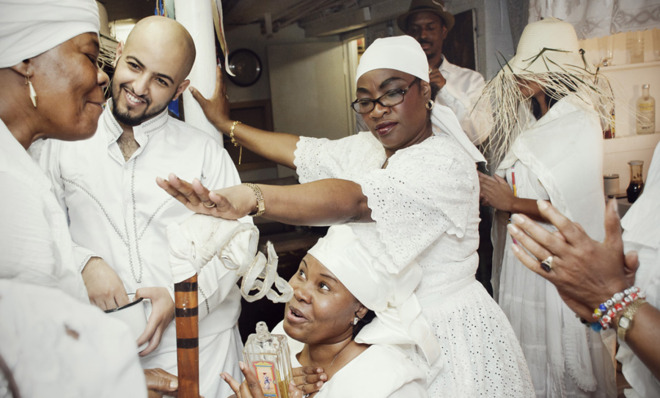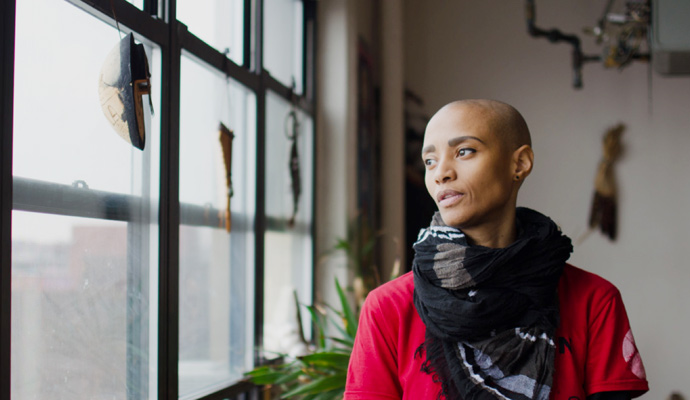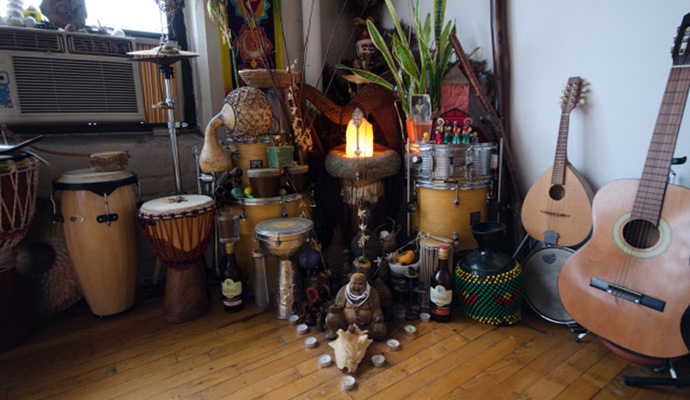The truth about Vodou
"Dolls and pins are a creation of Hollywood, closer to German and English witchcraft than to African witchcraft. Religions and witchcraft are not the same thing."

A free daily email with the biggest news stories of the day – and the best features from TheWeek.com
You are now subscribed
Your newsletter sign-up was successful

I walk down the narrow basement stairs with ease, but before I can cross the entryway into the warm candlelit temple, the oungan, a male priest in the Haitian Vodou tradition, hands me a ceramic jar filled with water. Pointing to the entryway floor, he motions towards three spaces and asks me to drop water for Papa Legba, the Vodou spirit who grants or denies human access to communicate with any of the Vodou spirits, or lwas.
I pour the water. My salute to the gatekeeper had been approved. I enter.
"If the spirits aren't happy they'll tell me," he says, smiling slightly. "They'll tell me what kind of energy you have.
The Week
Escape your echo chamber. Get the facts behind the news, plus analysis from multiple perspectives.

Sign up for The Week's Free Newsletters
From our morning news briefing to a weekly Good News Newsletter, get the best of The Week delivered directly to your inbox.
From our morning news briefing to a weekly Good News Newsletter, get the best of The Week delivered directly to your inbox.
"A lot of people come in just to see what Vodou is about," he cautions. "The spirits can tell your intentions."
When I reach for my camera, he objects. "Spirits don't like pictures. As a priest you don't do anything the spirits won't be happy with."
Vodou is no spectacle. That's the primary message I received as an inquiring writer journeying into New York's tightly-knit, yet surprisingly diverse Vodou community. The voyage began in Fort Greene, Brooklyn, at the South Oxford Space arts center, for Verite Sou Tanbou: The Truth about Haitian Vodou. It was the first installment of a three-part series of educational workshops about Vodou. That day, Oungan Dieudonné Jean-Jacques spoke calmly in his native tongue, which was translated for the racially and linguistically diverse attendees who packed the room to capacity. In the crowded hallway, between the moments of silence, attendees whispered amongst each other in Creole, French, and English — even a scattering of Spanish.
Benin (formerly Dahomey), a slender sliver of a country in West Africa, is widely considered the cradle of Vodou, which came to Haiti (then called Saint-Domingue) in the 18th century. Vodouists believe there is one distant God, Bondyè, who is the creator of all things — but they serve a long list of lwas through prayer and by presenting offerings, creating devotional objects and altars, and participating in ceremonies brought to life through traditional song, dance, spirit possession and animal sacrifice. Lwas are said to speak with, guide, and offer protection to the faithful on their journey through life.
A free daily email with the biggest news stories of the day – and the best features from TheWeek.com
(More from Narratively: A magical mentorship)
While the Vodou community is constantly expanding to people of various ethnic, social and economic backgrounds, it remains a misunderstood spiritual world and a stigmatized religion. Many Vodouists find themselves constantly trying to set the record straight about a culture they respect and love.
"If you consult any dictionary," says Professor Patrick Bellegarde-Smith of the University of Wisconsin, Milwaukee, an oungan himself, "you shall see that the definitions of 'voodoo' — it won't use generally the Haitian spelling of Vodou — remain static over many decades."
Professor Bellegarde-Smith says the widespread misrepresentation of Vodou came to the fore during the U.S. military occupation of Haiti, from 1915 to 1934, when, as he puts it, "Hollywood, as loyal Americans, come to the rescue of the U.S. state, and justified further that brutish occupation by creating the 'voodoo' we now know, and the zombie films that became a basic staple."
Indeed, when I Googled, "what is voodoo?" the first hit describes not an ancient religion but a black religious cult characterized by sorcery and spirit possession. Even in Haiti itself, it wasn't until 2003 that the country's Catholic president, Jean-Bertrand Aristide, acknowledged Vodou as one of Haiti's official religions.
Recently, three New York Vodouists each shared their unique story and deeply personal relationship to the religion: a passionate Haitian-born musician, a priestess and scholar who works to educate the masses about her religion, and a young Arab priest who was unexpectedly summoned by the spirits into the foreign land of Vodou.

Perched on an aged leather chair, Val Jeanty rests the back of one hand over her mouth while the other navigates the track pad on her laptop. Her mahogany eyes are alive and focused on the screen in front of her. As she adjusts the levels on her soundboard, the beat of drums and unidentifiable instruments pulsate throughout her Bedford-Stuyvesant nook. The rest of the world is clearly silenced for Jeanty, her focus on the music so intense it seems as if her studio has solid, soundproof walls that separate it from the rest of her spacious loft, only it doesn't.
Val Jeanty plays one of her original tracks at her Bedford-Stuyvesant, Brooklyn home studio
"So how long have you been living here?" I venture.
Looking up, she breaks into a wide smile and laughter explodes, her cheek bones reaching for the sky. She's back. She lowers the music.
Jeanty, 38, is tall and slender, casually clad in army fatigue pants and layered red and black cotton tees. Her amber-toned face is radiant and bare, tiny dark studs rest in her ears, and a black scarf hangs around her neck.
Vodou was a natural part of Jeanty's family and culture growing up in Port-au-Prince, the capital of Haiti.
"You know they say, 'Haitians are 85 percent Catholic, but 100 percent Vodouists,'" she relates, cracking a popular cultural joke. Indeed, many Haitians see no conflict in being both Catholic and Vodouists. Like other ethnic groups in the Americas, they have combined Christian beliefs with distinct traditional practices, and some believe that to be a good Vodouist, you have to be a good Christian.
(More from Narratively: Miracles on 34th Street)
Jeanty's late grandmother was a mambo. Decrying what she considers "the fancy, mystical description," a mambo, says Jeanty, is like a shaman — someone who acts as intermediary between the natural and spiritual worlds.
"It's about being connected to nature," Jeanty explains. Her grandmother communicated with the plants and could identify exactly which one was poisonous or which was meant for healing — which leaf cured a tummy ache and which could put you to sleep. Jeanty herself is a strong believer in animism, the concept that natural objects, phenomena, and the universe itself possess souls. "Everything is alive," says Jeanty. "If I walk next to a tree I'm not going to spit on the tree, because I'm spitting on myself."
For her, "[Vodou] is more of a way of life, less of a religion." It's about listening to the ancestors speak to you and accepting the information they bring.
Iframe Code
Du, a song by Val Jenty
"I was born in the pouch. In Vodou that kid is a special kid… they carry a heavy burden," says Jeanty, noting that not all Haitian children are born into Vodou, but that those who are tend to stay the course.
Jeanty says the Vodou within her was made evident by childhood experiences of unconsciously, yet systematically, rising from bed in the middle of the night and marching across her family's land to their property gates. From this, her family knew Papa Legba would be a special lwa for her. Described as a small old man dressed in rags who walks with a cane but is particularly powerful, Legba is the chief of crossroads and gates. Jeanty's routine walk to her family's gates seemed to be symbolic.
In Vodou, certain days of the week are dedicated to particular lwas, which each have distinct personalities and different roles. Some can be quite "feisty," Jeanty says. "If you're not connected to certain deities you should stay away," she laughs.
Jeanty doesn't believe one has to systematically serve all lwas; rather, you naturally navigate towards the ones you connect to. For her, two in particular are important. Jeanty serves Papa Legba on his day, which is Monday, by pouring water at the entryway of her loft. The cleansing element of water clears Jeanty's home and spiritual passageway so whatever needs to happen in her life can, and will.
She also honors Erzulie Dantor on Tuesday by wearing the lwa's favorite colors of red and black. Known as the Black Madonna for her motherly and protective quality, Erzulie Dantor represents the energy Jeanty naturally has within. Jeanty doesn't have children but her face lights up when she speaks of her students at The Door, a local organization that serves disconnected youth, where she teaches drum classes, percussion and DJ skills.
Exchanges with the lwa should happen naturally, Jeanty insists. "I don't think about Legba, I just give him water. You don't do it because of Legba, you do it for you. I naturally reach for red and black on Tuesday. It's synchronicity."
Jeanty says her Afro-electronica music "is not for commercial use, it's for the spirit" — and for exposing others to Haitian culture. "I always start with a primitive rhythmic pattern, which is definitely influenced by the Vodou culture." From there, she improvises, channeling whatever expression she hears and mixing in high-tech digital instruments alongside the traditional Haitian drum.
Jeanty's goal is to use her unique music and positive energy to subtly expose people to Vodou. She has performed at the Whitney Museum and the Museum of Modern Art, and internationally at music festivals in Austria and Switzerland. In May, she'll perform in Poland at the Planete + Doc Film Festival, which will feature The United States of Hoodoo, a documentary in which she speaks about sound and frequency and how they connect the realms of spirituality.
(More from Narratively: Friday night magic)
While she is not an angry warrior — Jeanty emanates peace as much as the wooden Buddha that sits at the center of her shrine — she is passionate about addressing the misrepresentations of Vodou culture, and boils at the thought of it being used as a commodity. The internet is a hotbed for Vodou commodification and, in many cases, fraud. She recoils at the fact that one can find a "love potion" or "money spell" online from an "authentic" Haitian mambo as long as you have $129.99 and a PayPal account.

"When you go to the priest to get a boyfriend or girlfriend, it becomes mundane, it becomes a circus," she says, her signature laughter buckling into the air. "You get away from the real Vodou, and it becomes a Gucci T-shirt."
Real Vodou, she says, is very subtle. "You don't even have to talk too much. If it's dramatic, it's not real."
The alleged association with evil hexes is what most bothers Jeanty and many other Vodouists.
"Dolls and pins are a creation of Hollywood, closer to German and English witchcraft than to African witchcraft," says Professor Bellegarde-Smith. "Religions and witchcraft are not the same thing. The lwa are beyond good and evil, and since we have free will, one can 'use' them for both, realizing that there will be beneficent outcomes or hell to pay for what each one of us has done with her/his free will."
"It's the person that knows little tricks," says Jeanty. "Don't underestimate the power of the human mind. You can brew up a spell. The people that run the government, the banks — they're sorcerers."
The evil that exists within each of us is real, Jeanty confirms with no hesitation, the question is how individuals — vodouists or not — choose to address this energy.
"Vodou is like a gun," she says, her tone serious. "You can pick it up and save your grandmother's life or shoot yourself." In Vodou, there is no good or bad, she insists. "It's just energy."
Read the rest of this story at Narratively.
Narratively is an online magazine devoted to original, in-depth and untold stories. Each week, Narratively explores a different theme and publishes just one story a day. It was one of TIME's 50 Best Websites of 2013.
-
 Will increasing tensions with Iran boil over into war?
Will increasing tensions with Iran boil over into war?Today’s Big Question President Donald Trump has recently been threatening the country
-
 Corruption: The spy sheikh and the president
Corruption: The spy sheikh and the presidentFeature Trump is at the center of another scandal
-
 Putin’s shadow war
Putin’s shadow warFeature The Kremlin is waging a campaign of sabotage and subversion against Ukraine’s allies in the West